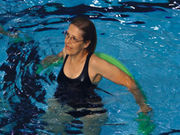Females with multiple sclerosis report decreases with yoga, aquatic exercise versus non-exercise control
MONDAY, May 9, 2016 (HealthDay News) — For females with multiple sclerosis (MS), the addition of exercise programs to standard immune modulatory therapy can improve fatigue, depression, and paresthesia, according to a study published in the May issue of Medicine & Science in Sports & Exercise.
Nazanin Razazian, M.D., from the Kermanshah University of Medical Sciences in Iran, and colleagues examined the effect of yoga or aquatic exercise on fatigue and depression in patients with MS. Fifty-four women with MS were randomized to yoga, aquatic exercise, or non-exercise control, with no change in their existing immune modulatory therapy. Questionnaires covering symptoms of fatigue, depression, and paresthesia were completed at baseline and on study completion eight weeks later.
The researchers found that fatigue, depression, and paresthesia decreased significantly in the yoga and aquatic exercise groups compared with the non-exercise control condition, and over time. The likelihood of reporting moderate to severe depression was 35-fold higher on study completion in the non-exercise control condition, compared with the intervention conditions (yoga and aquatic exercise).
“The pattern of results suggests that for females with MS and treated with standard immune regulatory medication, exercise training programs such as yoga and aquatic exercising positively impact on core symptoms of MS, namely, fatigue, depression, and paresthesia,” the authors write. “Exercise training programs should be considered in the future as possible complements to standard treatments.”
Full Text (subscription or payment may be required)
Copyright © 2016 HealthDay. All rights reserved.








